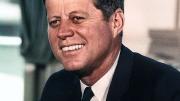John F. Kennedy, S.B. ’40, LL.D. ’56, then a U.S. senator, gave one of the two addresses delivered on the afternoon of Commencement day in 1956. With words and anecdotes that resonate 55 years later, his speech examined the clash of and growing gap between the nation’s intellectuals and its politicians. Kennedy reported that an English mother had recently written to her son's school, "Don’t teach my boy poetry; he is going to stand for Parliament." “Well, perhaps she was right," the future president continued. "[B]ut if more politicians knew poetry, and more poets knew politics, I am convinced the world would be a little better place to live on this Commencement Day…."






